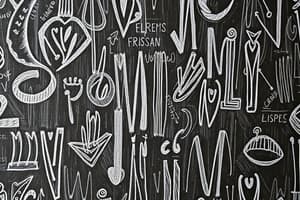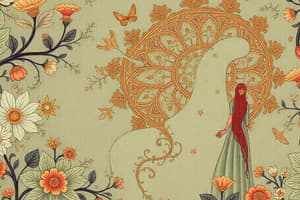Podcast
Questions and Answers
According to functionalism, society is viewed as a structure with interrelated parts designed to meet the __________ needs of individuals.
According to functionalism, society is viewed as a structure with interrelated parts designed to meet the __________ needs of individuals.
- Biological and social (correct)
- Economic and political
- Environmental and cultural
- Educational and technological
Who believed that society is a complex system of interrelated and interdependent parts working together to maintain stability?
Who believed that society is a complex system of interrelated and interdependent parts working together to maintain stability?
- Herbert Spencer
- Émile Durkheim (correct)
- Karl Marx
- Alfred Radcliff-Brown
What are social facts according to Émile Durkheim?
What are social facts according to Émile Durkheim?
- Economic theories
- Political ideologies
- Religious beliefs
- Cultural rules governing social life (correct)
Which type of functions are the consequences of a social process that are unsought and unintended?
Which type of functions are the consequences of a social process that are unsought and unintended?
According to Alfred Radcliff-Brown, how does any recurrent activity contribute to society?
According to Alfred Radcliff-Brown, how does any recurrent activity contribute to society?
'Conflict theory' views society as a competition for what?
'Conflict theory' views society as a competition for what?
What are beliefs?
What are beliefs?
Which type of norms are mores?
Which type of norms are mores?
What does high culture refer to?
What does high culture refer to?
What does cultural integration refer to?
What does cultural integration refer to?
Which term describes the spread of objects from one society to another?
Which term describes the spread of objects from one society to another?
What does cultural relativism involve?
What does cultural relativism involve?
According to Ludwig Gumplowicz, what leads to states being identified and defined by a dominant group?
According to Ludwig Gumplowicz, what leads to states being identified and defined by a dominant group?
What does Georg Simmel believe can help integrate and stabilize a society?
What does Georg Simmel believe can help integrate and stabilize a society?
What is the main goal of critical theory?
What is the main goal of critical theory?
Where did critical race theory originate from?
Where did critical race theory originate from?
According to the social-conflict paradigm, what do many cultural traits do?
According to the social-conflict paradigm, what do many cultural traits do?
What is the role of mediators in actor-network-theory?
What is the role of mediators in actor-network-theory?
Which cultural shift is mentioned in the text?
Which cultural shift is mentioned in the text?
What television series were viewed by individuals living behind the Iron Curtain as mentioned in the text?
What television series were viewed by individuals living behind the Iron Curtain as mentioned in the text?
Which individual taught us how to declutter our lives in a Netflix hit as per the text?
Which individual taught us how to declutter our lives in a Netflix hit as per the text?
What phrase are analysts using to refer to the spread of South Korean culture, as mentioned in the text?
What phrase are analysts using to refer to the spread of South Korean culture, as mentioned in the text?
Which consulting firm noted that Asia is becoming an increasingly significant cultural force?
Which consulting firm noted that Asia is becoming an increasingly significant cultural force?
What caused the increase in enrollments for Korean language programs in the United States?
What caused the increase in enrollments for Korean language programs in the United States?
What term was used to refer to Taiwanese drama series after the introduction of imported tv drama series from Taiwan and Korea?
What term was used to refer to Taiwanese drama series after the introduction of imported tv drama series from Taiwan and Korea?
Which country's government initiative and people's demand led to the production of better films and television dramas?
Which country's government initiative and people's demand led to the production of better films and television dramas?
Who mentioned that 'the East is coming' and has been transforming transnational flows of pop culture?
Who mentioned that 'the East is coming' and has been transforming transnational flows of pop culture?
What term is used to refer to television drama series or soap operas, particularly from Latin America?
What term is used to refer to television drama series or soap operas, particularly from Latin America?
What language programs witnessed the largest increase in enrollments between 2013 and 2016 in the United States?
What language programs witnessed the largest increase in enrollments between 2013 and 2016 in the United States?
Study Notes
American Cultural Influence on Television Industry
- American company CNN exemplifies global news, influencing the television industry worldwide.
- Television series like "Dallas" and "Dynasty" were viewed by individuals living behind the Iron Curtain, offering an unrealistic but appealing alternative to the communist lifestyle.
Rise of South Korean and Japanese Pop Culture
- There is a noticeable shift in the influence of South Korean and Japanese pop culture export.
- In 2019, Japanese consultant Marie Kondo taught people how to declutter their lives in her Netflix hit "Tidying Up with Marie Kondo".
- Analysts use the phrase "hallyu" or "Korean wave" to refer to the spread of South Korean fashion, beauty products, television dramas, and music in other countries, especially in Asia.
- According to Anthony Fung, an expert in pop culture, "the East is coming" and has been for a while, transforming transnational flows of pop culture.
Growing Interest in East Asian Pop Culture
- Enrollments in Japanese and Korean programs in the United States increased between 2013 and 2016, according to a study by the Modern Language Association of America.
- Enrollments for Korean language programs rose by 13.7%, the largest increase of any language being taught.
Telenovela and Koreanovela
- "Telenovela" is a term used to refer to television drama series or soap opera, particularly those from Latin America.
- The term was appropriated to refer to Taiwanese drama series as "Chinovela" and to Korean drama as "Koreanovela".
Functionalism
- Functionalism, also called structural-functional theory, sees society as a structure with interrelated parts designed to meet the biological and social needs of individuals.
- Herbert Spencer saw similarities between society and the human body.
- Émile Durkheim believed that society is a complex system of interrelated and interdependent parts that work together to maintain stability.
Social Facts and Functions
- Social facts are the laws, morals, values, religious beliefs, customs, fashions, rituals, and all of the cultural rules that govern social life.
- Manifest functions are the consequences of a social process that are sought or anticipated.
- Latent functions are the unsought consequences of a social process.
- Dysfunctions are social processes that have undesirable consequences for the operation of society.
Conflict Theory
- Conflict theory looks at society as a competition for limited resources.
- Karl Marx saw society as being made up of individuals in different social classes who must compete for social, material, and political resources.
Beliefs, Norms, and Material Culture
- Beliefs are specific statements that people hold to be true.
- Norms are rules and expectations by which a society guides the behavior of its members.
- Mores are norms that are widely observed and have great moral significance.
- Folkways are norms for routine, casual interaction.
- Material culture reflects a society's technology and knowledge used to make a way of life in their surroundings.
Cultural Diversity and Integration
- Cultural diversity can involve social class.
- High Culture refers to cultural patterns that distinguish a society's elite.
- Popular Culture refers to cultural patterns that are widespread among a population.
- Subculture refers to cultural patterns that set apart some segment of society's population.
- Counterculture refers to cultural patterns that reject and oppose those widely accepted within society.
- Cultural Integration refers to the close relationships among various elements of a cultural system.
- Cultural Lag refers to some elements of culture changing faster than others.
- Cultural Changes refer to new cultural elements.
- Cultural Diffusion refers to the spread of objects from one society to another.
Ethnocentrism and Cultural Relativism
- Ethnocentrism is the practice of judging another culture by the standards of one's own culture.
- Cultural Relativism is the practice of evaluating a culture by that culture's own standards.
Critical Theory and Sociobiology
- Critical theory attempts to address structural issues causing inequality.
- Critical race theory grew out of a critical analysis of race and racism from a legal point of view.
- The social–conflict paradigm suggests that many cultural traits function to the advantage of some and the disadvantage of others.
- Sociobiology is the systematic study of the biological basis of social behavior of human.
Actor-Network-Theory
- Actor-Network-Theory states that popular culture is not just people acting and interacting, but also people acting and interacting with material objects and material objects interacting with each other.
- Intermediaries convey meaning unchanged.
- Mediators transform, translate, distort, and modify the meaning they are supposed to carry.
- In a network, all actors act, and there is movement not between intermediaries but between mediators.
Studying That Suits You
Use AI to generate personalized quizzes and flashcards to suit your learning preferences.
Description
Test your knowledge on beliefs, norms, and cultural diversity in sociology. Explore topics such as specific statements held as true, societal rules, and material culture reflecting technology.




